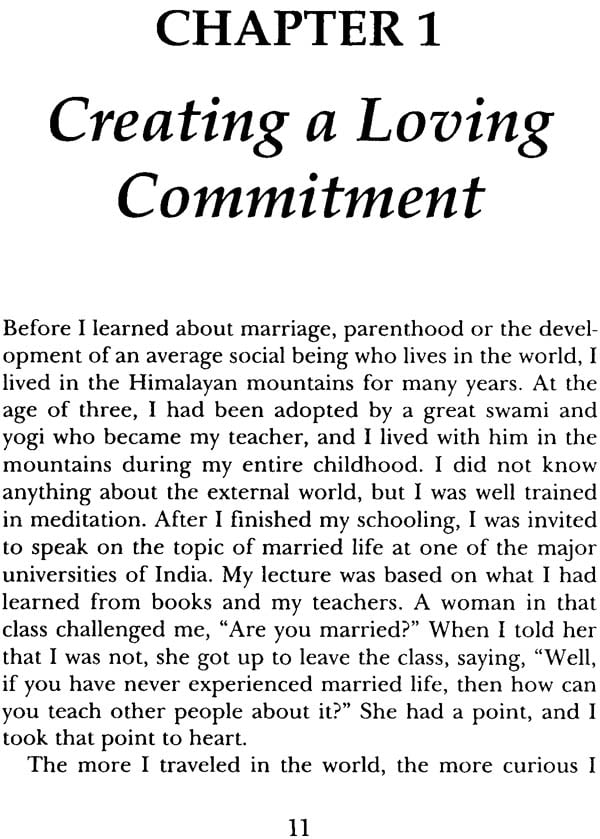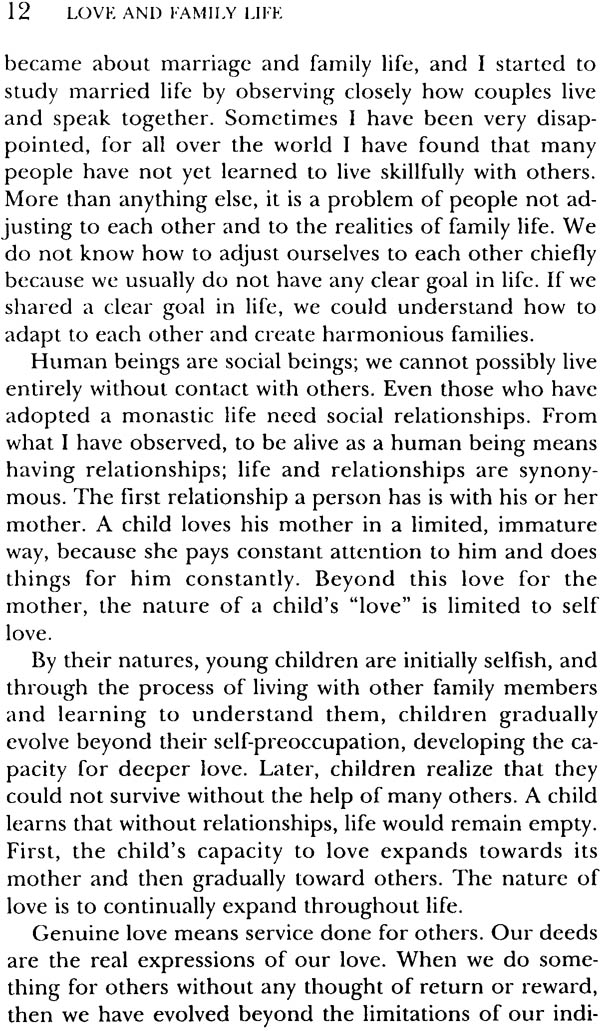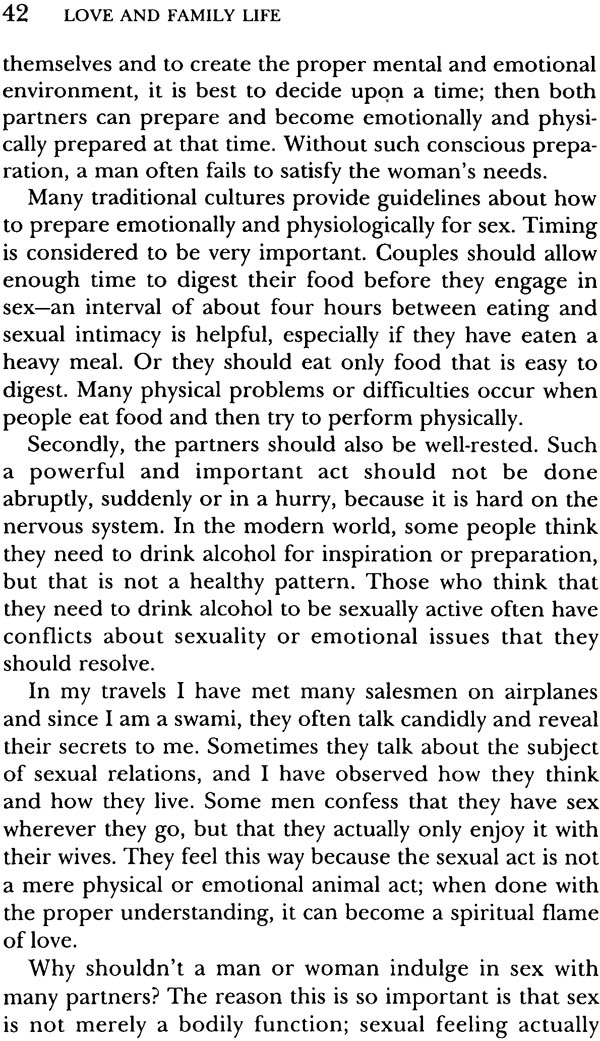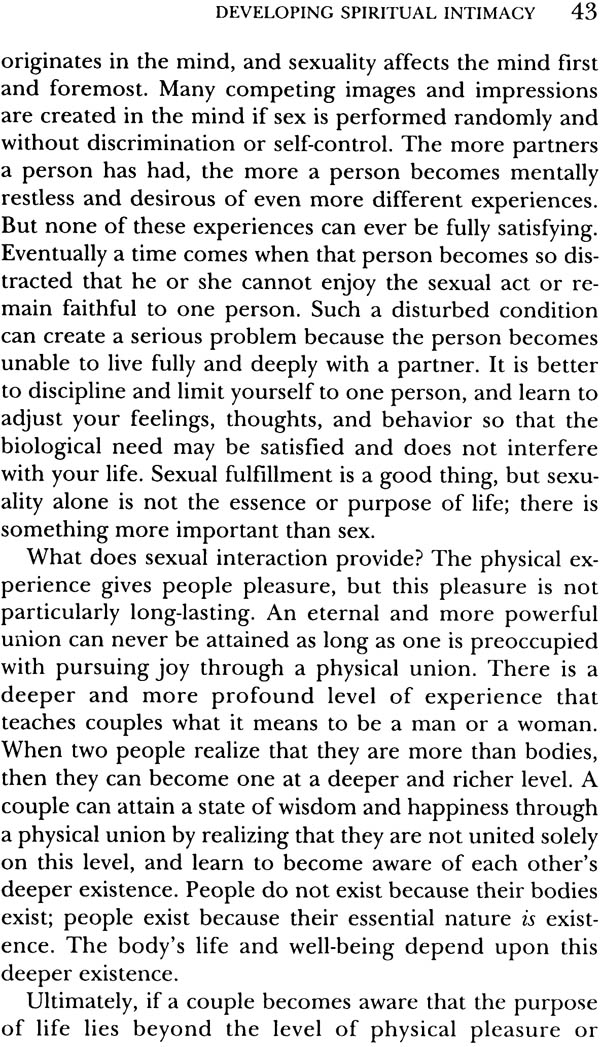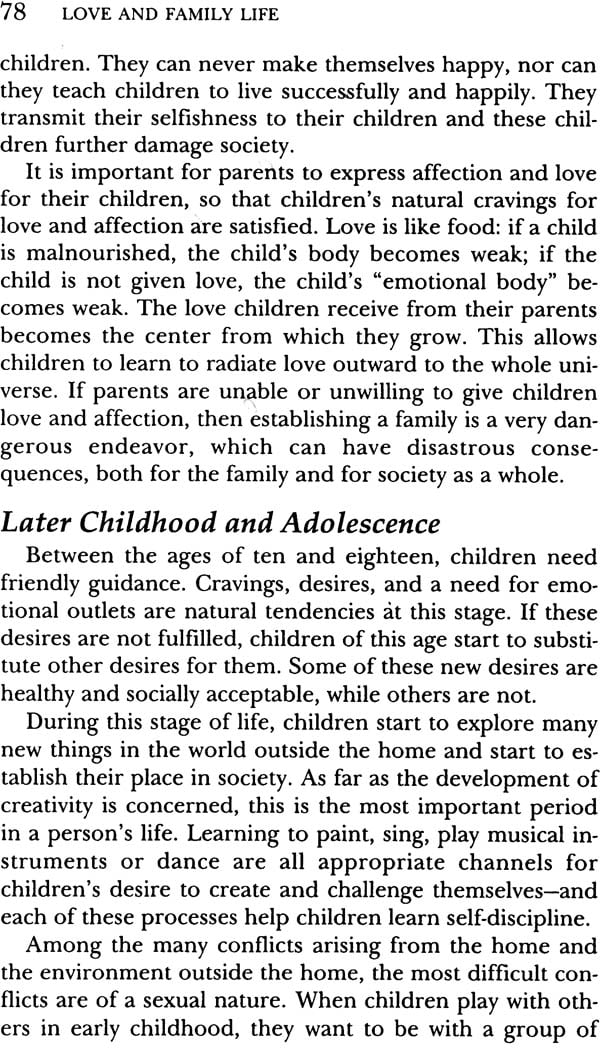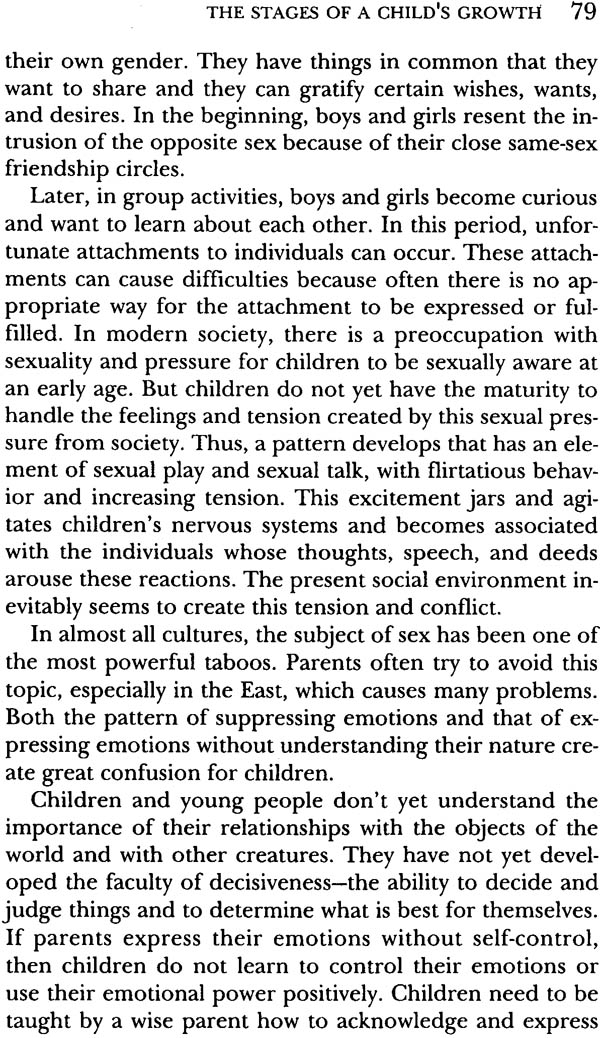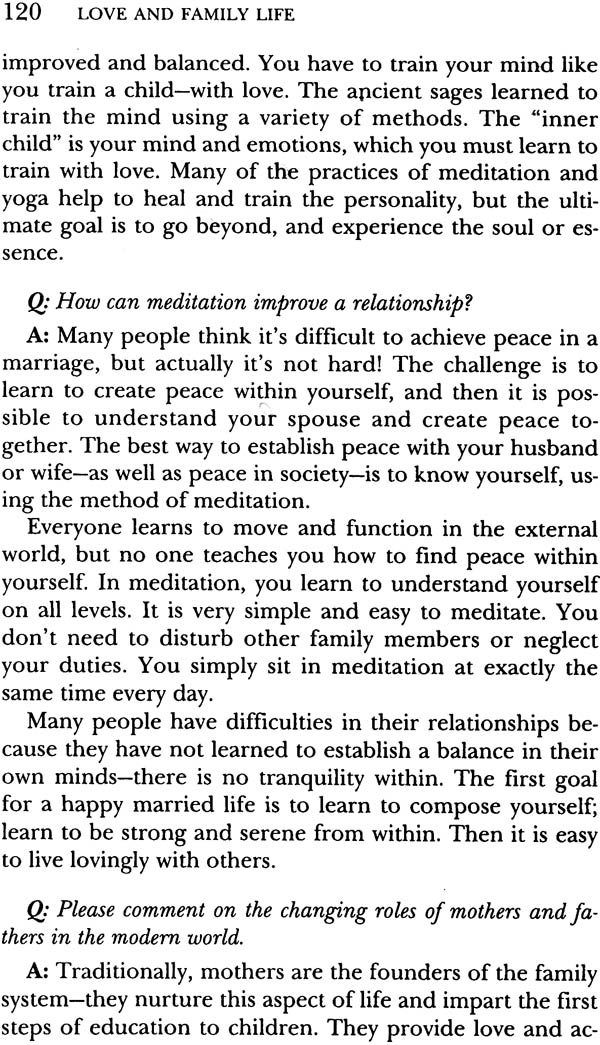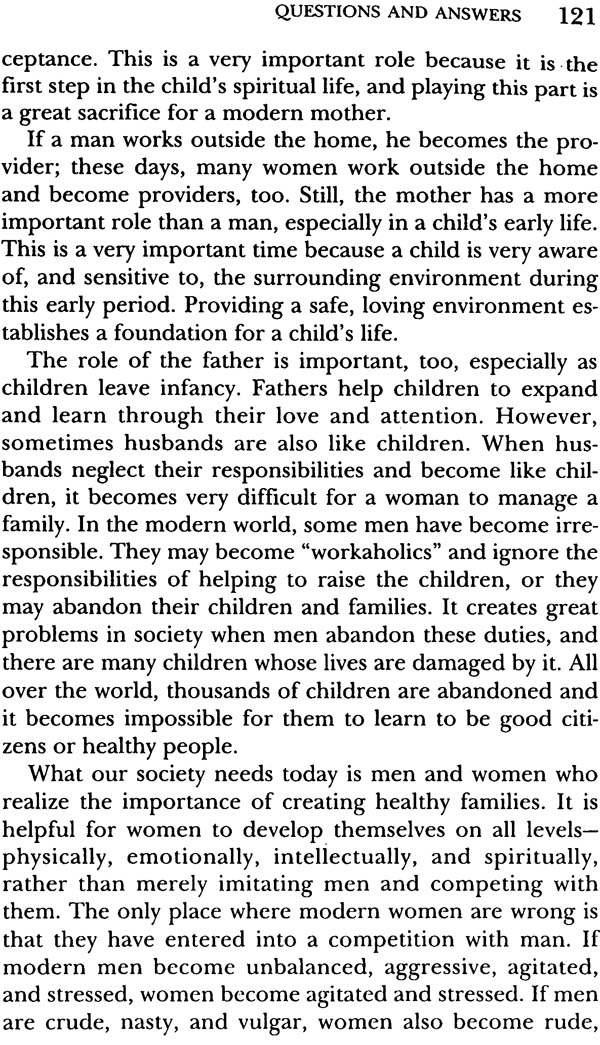
Love and Family Life
Book Specification
| Item Code: | NAG673 |
| Author: | Swami Rama |
| Publisher: | Himalayan International Institute of Yoga Science and Philosophy |
| Language: | English |
| Edition: | 2013 |
| ISBN: | 9780893891336 |
| Pages: | 145 |
| Cover: | Paperback |
| Other Details | 8.5 inch X 5.5 inch |
| Weight | 190 gm |
Book Description
About the Book
This inspiring book will be helpful to anyone who is seeking to understand the dynamic interplay between loving relationships and the path of spirituality. In clear, candid language, Swami Rama presents his vision of the potential that marriage and family life have to help us open our heart, expand our personality, and contribute to our spiritual unfoldment. This invaluable guide devotes itself to one of the most powerful and influential aspects of any person’s life: our capacity to love and share ourselves with others. It will assist all who are sincerely striving to develop themselves and their relationships and to fulfill the ultimate purpose of life.
Portions of some chapters of this book were previously published in a somewhat different form in Marriage, Parenthood and Enlightenment by Swami Rama.
About the Author
One of the greatest adepts, teachers, writers, and humanitarians of the 20th century, Swami Rama is the founder of the Himalayan Institute. Born in Northern India, he was raised from early childhood by a Himalayan sage, Bengali Baba. Under the guidance of his master he traveled from monastery to monastery and studied with a variety of Himalayansaints and sages, including his grandmaster who was living in a remote region of Tibet. In addition to this intense spiritual training, Swami Rama received higher education in both India and Europe. From 1949 to 1952, he held the prestigious position of Shankaracharya of Karvirpitham in South India. Thereafter, he returned to his master to receive further training at his cave monastery, and finally in 1969, came to the United States where he founded the Himalayan Institute. His best known work, Living with the Himalayan Masters, reveals the many facets of this singular adept and demonstrates his embodiment of the living tradition of the East.
I was raised and educated in the cave monasteries of the Himalayas and my "family" was my Master, a great sage who raised me from the age of three, after my parents had died. My master was both mother and father to me, and in my entire life, I have not met anyone since who has exhib- ited such complete love and dedication-he did everything possible for my welfare, and he never took anything for himself.
At times I have felt some sadness, because there was nothing I could give him to fully express my appreciation. He would never even accept a flower from me as a gesture of love. To me, he was the living example of unconditional love and selflessness. Throughout my training with him, he expressed his love in many diverse ways, which changed as I grew. Whatever good I have achieved in life actually belongs to him. He was the perfect parent, able to give total acceptance, and yet also to be honest and stern with me when I needed correction.
At times I was a nuisance; as a young child, I was some- times naughty when I wanted his attention, and I dis- tracted him from the depths of his meditation, but he ac- cepted the responsibility of training me with love. This lov- ing relationship provided the foundation of my life, and it is how I understand the great power that parents have to guide and help their children on the path of life.
In the years since I left the Himalayas, the place where my education began, I have traveled in the world, teaching and conducting research, and in the process, learning by observing the lives of thousands of people, both those who reside in families and those who have withdrawn from the conventional worldly life. I met hundreds of great souls in my travels, particularly in those remote mountain areas where there still dwell genuine sages, who continue to guide and lead mankind by their presence.
I have also met those who inhabit monasteries through- out the world, and have many times been disappointed, for some of those who take up this life do so from fear of accepting responsibility. Other times I have observed hy- pocrisy and arrogance in these supposedly holy people, as well as egotism about their status, which creates barriers between themselves and others. I did not observe the ca- pacity to love and serve humanity. I visited monasteries all over the world, but I eventually came to the regretful con- clusion that some of the greatest hypocrites of all time lived in those monasteries. I was so disappointed and dis- illusioned that I thought, "What good is this life, if people are living so falsely? Why should people meditate or pray twelve hours a day if they are avoiding their responsibili- ties and developing enormous egos, rather than becoming more loving and selfless?"
And in the last several decades, all over the world, I have also observed many families as I traveled and taught. Couples have spoken to me of their marriages and their frustrations and successes. I have studied many kinds of families-happy and unhappy, poor and rich, young fami- lies, couples without children, and divorced parents rais- ing children alone. I have met people whose lives were miserably poor but who gave their children everything they could-all the love and attention they could provide. And I have met couples who came to see me together, smiling and praising their partner with sweet words, while they were thinking of meeting with another man or woman. Sometimes these experiences made me very sad . for the family.
I also talked with many sincere people who sought to follow a spiritual path while creating loving family lives in the world. Sometimes I have found in these married people a greater level of spiritual awareness and sincerity than in those who live monastic lives. There are many sin- cere and dedicated people in the modern world, East and West, who are trying to follow the path of a practical spiri- tuality. They meditate and also fulfill their responsibilities to their partners, children, and the society in which they live through their selfless, active lives. Whenever I wanted to know whether a couple I met was genuinely happy and content, I would tell them, "You seem to be very happy," and then the reaction on their faces would tell me whether they were truly loving with each other, or whether their polite behavior was only superficial.
I have also seen many changes in the past twenty years, both in the East and in the West. There is increasing vio- lence everywhere in the world, a crumbling of the founda- tions of the society, which creates many problems-rising rates of divorce and family conflict, problems with alcohol and drugs, and the inability to raise healthy, balanced chil- dren. There is also a pattern of greater stress, which chal- lenges the physical and emotional health of even those who do not exhibit the most disastrous social problems. We look at our world and wonder how we will create peace and freedom. We want to successfully fulfill our re- sponsibility to educate and train the children, those tender buds, who are given to us to nurture and raise.
In answering these questions it is clear that family life is important, because the foundation for life is established in childhood, especially in the first seven years. This sets a pattern for the duration of our lives. A great man once said, "Give me only the first seven years of life; the rest you can take." He meant that these first years are of the greatest importance in determining the course of life. If childhood is healthy, then we have established a good foundation as human beings, and we are able to care for ourselves, contribute to society, and share our love with others. This means that we can also take the next step in life, the step of being able to explore the spiritual dimen- sion of ourselves. However, if these first years of child- hood are unhealthy, then they create problems and con- flicts that we must overcome later in our lives, and which may even interfere with our ability to attain our goal. It is possible to resolve these problems and conflicts, although to do so may consume much of our adult lives. But life is like a school, and we cannot go on to the next level until we have completed the basic lessons. Families are the cen- tral training grounds for the entire life, the first step in a child's spiritual development. Parents are their children's first gurus, and if they complete their duties wisely, then the child moves on to other levels of learning.
Contents
| Introduction: Why Are Families Important? | 1 | |
| l. | Creating a Loving Commitment | 11 |
| 2 | Developing Spiritual Intimacy | 27 |
| 3 | Children | 45 |
| 4 | The Stages of a Child’s Growth | 67 |
| 5 | Attaining Spiritual Fulfillment | 87 |
| 6 | Questions and Answers | 105 |
| About the Author | 129 | |
